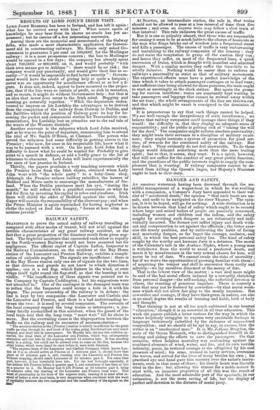DANGER AND SAFETY.
AN amateur waterman having been drowned through the un- skilful management of a wager-boat in which he was sculling with a companion, a Coroner's Jury have appended to their ver- dict of" accidental death," the opinion "that such boats are un- safe, and unfit to be navigated on the river Thames." The opin- ion, it is to be hoped, will go for nothing. A wide distinction is to be drawn between that kind of safety, which ought to be secured where large and mixed bodies of people are passively concerned, including women and children and the infirm, and the safety sought by avoiding such dangers as are voluntarily and indi- vidually incurred. The former sort inflict injury and death with- out any compensation to set against the affliction ; the latter exer- cise the manly qualities, and by cultivating the habit of facing and mastering danger, so far beget the courage, coolness,, and skill, in which the best personal safety lies. The kind of safety sought by the worthy and humane Jury is a delusion. The moral of the Calendar's tale in the Arabian Nights, where a young man is withdrawn from the world to avoid a predicted death, and meets it by misadventure in the very retreat chosen for him, will never be out of date. We cannot evade the risks of mortality ; but if we waive the opportunities of growing familiar with them— of acquiring the temper and skill to encounter them coolly and adroitly—we lay ourselves disarmed at the mercy of fate.
That is the lowest view of the matter : a vast deal more might be said of the bad moral effects induced by a cowardly shrinking from personal danger—the self-seeking, the enfeebled devotion to others, the stunting of generous impulses. There is scarcely a vice that may not be fostered by cowardice—by that moral weak- ness which will not allow fair play to the manly impulses. But cowardice and courage, if they have their germ in nature, are also in no small degree the results of training and habit, both of body and thought.
That training is not at all too much cultivated in our boasted "education," though it is an essential in all true education. This week the papers publish a letter curious for the way in which the writer helplessly struggles to express very creditable feelings in language ludicrously enfeebled by the rudeness of unpractised composition ; and we should all be apt to say, in excuse, that the writer is an "uneducated man." It is Mr. Jotham Bragdon, the mate of the Ocean Monarch, who so distinguished himself in di- recting and aiding the efforts to save the passengers. On that occasion, when helpless mortality was contending against the combined elements of wind, water, and fire, and its own terrible infirmity, panic, he restored courage to the affrighted by his cool presence of mind ; his arms, trained in hardy service, overcame the waves, and served for the lives of many besides his own ; his practised eye and hand gave him mastery over the sailor's instru- ments, even in that scene of chaos ; his manly heart was literally tried in the fire : but, allowing the utmost for a noble nature to start with, an immense proportion of all this was the result of education. And the most admirable part of the spectacle, in our estimation, is not the mere saving of life, but the display of perfect self-devotion to the dictates of social piety.


























 Previous page
Previous page